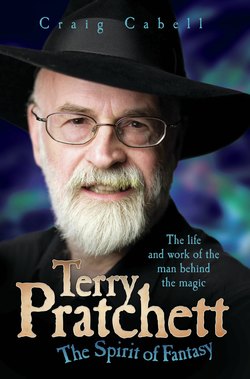Читать книгу Terry Pratchett - Craig Cabell - Страница 8
На сайте Литреса книга снята с продажи.
Introduction
Оглавление(or what this book is and what this book isn’t)
‘… there are some things we shouldn’t forget, and mostly they add up to where we came from and how we got here and the stories we told ourselves on the way.’ Terry Pratchett (Introduction, The Folklore of Discworld)
Strange things happen to you when you read Terry Pratchett’s novels on the train. People bend over to study the cover and say ‘I’ve read that one’, which is really annoying. Even a ticket inspector has said that to me.
Pratchett’s books are instantly recognisable nowadays, mainly for their impressive Josh Kirby dustwrappers. I know this because during a completely different train journey, I was reliably informed by a fellow passenger that somebody else was reading a book by the same author because the cover was ‘bright and colourful and, well, quite similar, so it must be the same writer’.
There are fans of different characters within the Discworld series, from Rincewind and Luggage to Death and Granny Weatherwax, but perhaps more focus has been placed on Pratchett himself in recent years. Since December 2007, when he publicly announced that he was suffering from the early stages of Alzheimer’s disease, Pratchett has spoken out about the affliction and his own personal plight. He has made a substantial donation to Alzheimer’s Research UK, $1 million, and filmed a two-part programme about the disease for the BBC.* The confrontation he has had with his illness has won the hearts of many people, not just those who love his books, and he continues in his ceaseless quest to break down the stigma attached to the illness.
Pratchett has stated openly that he desires to take his own life when the Alzheimer’s becomes too unbearable. He said he would like to end it ‘sitting in a chair with a glass of brandy in my hand and Thomas Tallis on the iPod’, and many people sympathise with that. Unfortunately the law is not a living, breathing human being and doesn’t necessarily see it that way.
What I personally find fascinating about Terry Pratchett is his spirit, and it’s that inner strength and ability to tackle the world full on which is the main theme of this book.
Terry Pratchett – The Spirit of Fantasy is not an unofficial biography and not a Discworld companion. It is a tribute to a man who has sold 70 million copies of his books worldwide in 38 languages, and who has shown that he wears his heart on his sleeve, even long before his illness. It is also a book that applauds a writer of fantasy whose very soul lives in the real world; and that’s what makes him popular – his ability to make his audience empathise with his works and the real world around them.
Alzheimer’s Research UK is the United Kingdom’s leading dementia research charity. It was founded in 1992 and is totally dependent on donations from individuals, not the government.
It is not my wish to over-analyse and discuss the characters and plotlines of every Terry Pratchett novel in this book. A thousand words on each novel alone would be higher than the entire word count available for this book, and would offer nothing new or insightful about the man or his works. So a different approach was needed, one that exposed relevant moments, situations and characterisations in his work against the backdrop of his life, philosophy and career, in comparison to the fantasy he writes. This may be frustrating for some Pratchett fans, who would like an in-depth analysis of, say, the Night Watch and the streets of Ankh-Morpork, but it is Terry Pratchett himself and how his work reflects the man that are important here.
Pratchett was knighted in the 2009 New Year’s Honours. He had received an OBE in 1998 for services to literature, and many agreed that the accolade was well deserved by the much-loved author.
Pratchett’s career as a novelist started long before The Colour of Magic, his first Discworld novel in 1983. His first novel, The Carpet People, appeared in 1971 and is hugely collectable in its first edition nowadays. But what do the early works tell us about the man, and how did they set the scene for the Discworld novels that followed?
One must pay tribute here to Terry Pratchett’s official website and to his agent Colin Smythe’s website, which list a very comprehensive bibliography. I freely admit that I checked my own collection and other titles against these sites, along with claims of additional collectables; if items appeared to exist outside these official sources, I demanded to see evidence of their existence first.
There is more to Sir Terry Pratchett’s life than Discworld, and this book makes that clear. Conversely, Discworld is so far-reaching, and the books and associated collectables so vast, that an extensive bibliography has been included at the end of the book (Annex C) for the incurable fan.* Not only does this provide a user-friendly checklist of items to acquire but also showcases the sheer volume of work Pratchett has produced and the amount of energy his publishers, agent and various artists have put into creating collectable editions of his works. This is also showcased in Annex A, in which I look at the films (mainly TV mini-series) made from Pratchett’s work, which are all worthy of mention and are much-loved companions to the novels for many fans.
Terry Pratchett is one of the most respected fantasy writers Britain has ever produced. He’s up there with Tolkien and CS Lewis, and one could not bestow a higher – or more relevant – accolade.
‘No choice was left them but to play their part to its end.’
JRR Tolkien (‘The Return of the King’, The Lord of the Rings)
